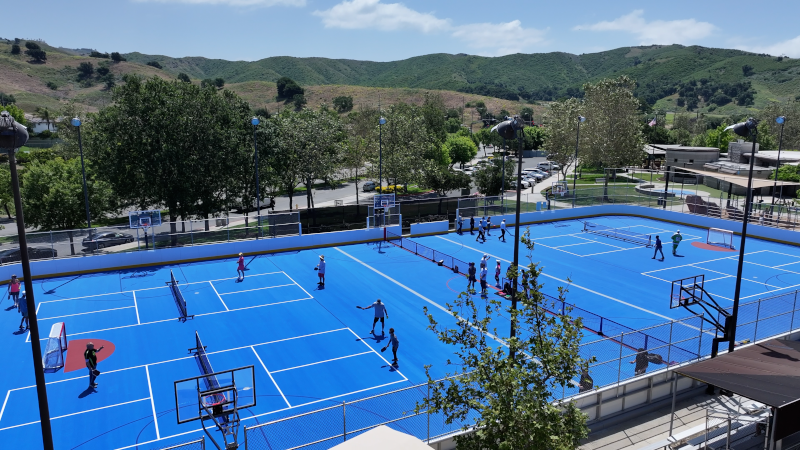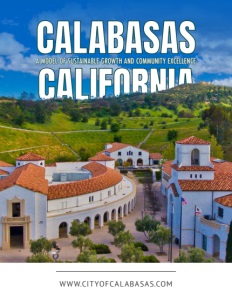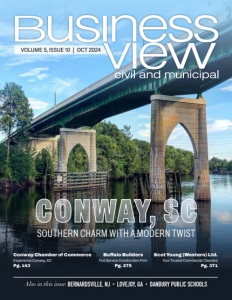Calabasas, California
A Model of Sustainable Growth and Community Excellence
Finely balancing environmental preservation, innovative development, and community well-being to create a thriving, future-focused city.
Calabasas, California, may be known to some as a celebrity enclave, but it’s a city with a rich history and a solid dedication to preserving its natural beauty. Nestled on the western edge of Los Angeles County, Calabasas offers a contrast to the bustling metropolis that surrounds it, a serene gateway to the Santa Monica Mountains. With a population of approximately 23,500 and covering about 13.3 square miles, it offers access to thousands of acres of open space and over 500 miles of trails. Approximately 40% of the city’s 13.3 square miles is dedicated to open space.
Incorporated in 1991, Calabasas focuses on safety, education, and community programs. “Calabasas is primarily a residential community,” notes Michael Klein, Community Development Director, highlighting the city’s modest commercial corridors designed to enhance the quality of life. The Las Virgenes Unified School District, “a key asset to the community,” serves both local and nearby students, consistently ranking among California’s best public school system. The city also offers diverse recreational programs, including a robust senior center catering to residents of its aging yet active population.
Old Town Calabasas serves as a cultural anchor, blending history with a lively, modern atmosphere. “The Calabasas Old Town actually borders L.A. city,” says Klein, where historical charm is maintained through a master plan that guides development. Unique shops, restaurants like “The Mulholland,” and a bustling weekly farmers market add to the area’s charm. Investments in upgraded sidewalks, L.E.D. lighting, and the preservation of the Old West theme, along with landmarks like the Leonis Adobe, enrich the community.
Diverse Educational Opportunities
Calabasas offers an impressive array of educational opportunities that extend beyond its public school system. While the Las Virgenes Unified School District plays a significant role in the city’s academic landscape, Calabasas also houses private institutions and higher education programs that further enrich the community’s learning environment.
In addition to the public schools, Klein points out, “There’s also a K through 12 private school, which is located in the city.” He refers to Viewpoint School, a unique institution set within the Santa Monica Mountains. The campus itself feels like a hidden gem, “almost like its own little canyon,” with an enrollment of about 1,200 students.
Higher education also finds a place in Calabasas through Pepperdine University’s satellite campus. “We’re proud that Pepperdine opened that up,” Klein says, noting that although the main campus is in Malibu, the satellite location in Calabasas has been part of the community for nearly a decade. This extension of Pepperdine brings a new dimension to the city’s educational offerings, especially with its upcoming Health Science program.

A Rigorous Approach to Community and Economic Development
Calabasas places a high value on community involvement and quality design in its development projects. The city’s Community Development Department (C.D.D.) oversees all aspects of planning and building, ensuring that any new development aligns with Calabasas’s standards and the community’s expectations.
Klein describes Calabasas’s “very robust permitting process,” where nearly every development undergoes public hearings to ensure community input and quality outcomes. The Planning Commission plays a key role, while the Architectural Review Panel, comprised of architects and developers, provides expert guidance to ensure a high-quality design. A unique requirement is the Community Development Forum. “For new commercial development and larger-scale residential or mixed-use projects,” Klein explains, developers must hold community meetings before submitting formal plans.
Central to Calabasas’s approach to development is its General Plan, a document required by California law that outlines a city’s priorities and long-term vision. “The city’s general plan was last… completely rewritten in 2008,” says Klein, replacing earlier fragmented documents with a cohesive blueprint. The 2008 revision, known as the 2030 General Plan, marked a fresh start, laying out a comprehensive blueprint for the city’s future. This plan emphasizes sustainable growth, earning the “Sustainable Communities Award” from the Southern California Association of Governments (SCAG).
“Calabasas effectively is a very built-out community,” Klein notes, with 40% of its area dedicated to open space. Given these limitations, the plan focuses on infill development and mixed-use opportunities rather than suburban sprawl. This approach ensures that new construction complements existing structures and preserves the natural environment. The 2030 General Plan highlights Calabasas’s efforts to support thoughtful development, balancing growth with sustainability and open space preservation, aligning with the city’s long-term priorities, and enhancing the quality of life for its residents.
Expanding Mixed-Use and Affordable Housing Initiatives
Calabasas is creating a balanced and sustainable community through the promotion of mixed-use developments and affordable housing. While most of the City maintains a lower-density residential zoning, existing commercial areas such as the Calabasas downtown Civic Center, offer prime opportunities for infill development. Klein describes the vision: “The entire area west of Old Town is zoned for mixed-use development.” This approach will repurpose underutilized commercial spaces, integrating housing into established commercial corridors.
The city has identified two principal commercial corridors for this mixed-use zoning: one adjacent to Old Town and another off Las Virgenes Road near the Pepperdine campus. Klein points out the importance of these areas meeting sustainability objectives, noting that they provide housing in developed areas already served by existing infrastructure. This setup allows residents “to walk down the street to get a cup of coffee or pick up some groceries as opposed to driving everywhere.”
Calabasas is proactive in meeting California’s housing laws, with Klein noting, “The city was one of the first… to get our housing element certified by the state.” The housing plan includes an inclusionary requirement for projects with five or more units to provide affordable housing. Developers can pay an in-lieu fee, but Klein adds, “We have very high in-lieu fee costs,” making on-site units more common.
To address the city’s high median home price of $2 million, an affordable housing overlay zone offers density bonuses and less stringent zoning standards for including additional affordable units, potentially increasing density from 24 to 50 units per acre. Calabasas also supports Accessory Dwelling Units (A.D.U.s) as a solution to the housing crisis, offering flexible living options for families.
A Strategic, Business-Friendly Approach to Economic Development
Calabasas focuses on creating an attractive environment for businesses of all sizes through strategic partnerships and a supportive approach. “The Calabasas Chamber of Commerce… [is] an excellent organizer of businesses,” says Klein, emphasizing the city’s partnerships with organizations like the Chamber and the Valley Economic Alliance. These relationships foster a network that supports business growth.
A key attraction is the city’s lack of a business license or tax, a feature that distinguishes it from neighboring areas. Klein notes the city’s “very approachable” nature, where new businesses receive personal assistance in processes like tenant improvements. Calabasas also offers a safe environment and amenities like “good restaurants, shopping, and great schools,” attracting businesses and residents alike. The presence of the top-rated Las Virgenes Unified School District further incentivizes companies to settle in the city, giving their employees access to the school system.
Despite limited undeveloped land, Calabasas maximizes space with high-quality commercial properties, including numerous Class A office buildings. “There are a lot of Class A office buildings that have good opportunities for businesses to move in,” Klein says, highlighting the city’s appeal to businesses like A.M.A. Waterways, H.R.L. Laboratories, and ResMed.
Economic growth is integrated with housing initiatives, focusing on mixed-use developments like “The Commons Lane,” a Caruso project transforming an existing shopping center into a residential and commercial hub, including “designated affordable housing.” Auto dealerships along Calabasas Road also significantly contribute to the city’s sales tax revenue, supported by a C.A.R. Overlay to “promote auto dealerships.” Another pending project is the Park Sorrento Apartments, featuring 100 units with over 20 designated as affordable. Projects like these show how the City’s General Plan supports economic vitality and diverse, affordable housing options.

A Holistic Approach to Sustainability
Calabasas’s approach to sustainability is comprehensive, encompassing not just environmental conservation but also innovative practices in water management and energy use. “Open space preservation is critical,” Klein emphasizes. Central to this effort is Measure O, an ordinance that requires any rezoning of open space to go to a community-wide vote, needing approval by two-thirds of the city’s voters.
This measure ensures that existing open space remains protected, preventing any one group from making changes at their discretion. Klein describes this as a strong reinforcement of the city’s focus on conservation. In addition to Measure O, Calabasas has a Tax Default Acquisition Program that allows the city to acquire properties in tax default and convert them into additional open space, further expanding the city’s protected areas.
Oaktree preservation is another crucial component of Calabasas’s environmental efforts, vital for maintaining the natural habitat and contributing to the community’s ecological health. Beyond this, the city has embarked on several sustainability initiatives aimed at enhancing the environment. One notable project is the Las Virgenes Creek Restoration Program. Phases one and two have already been completed, focusing on cleaning up the creek and replacing concrete sections with more natural surroundings.
Calabasas is further advancing sustainability through the Green Street program that captures rainwater in landscaped medians, enhancing streetscapes while efficiently managing water resources. Its Civic Center was built with sustainability in mind, with Klein noting, “The city hall… was certified through USGBC as a LEED Gold building.” Through the Clean Power Alliance, Calabasas sources 100% renewable energy via Southern California Edison unless residents opt-out. Additionally, the city supports the Pure Water Project, aiming to convert recycled water into potable water through advanced filtration, further boosting water conservation efforts.
Strategic Priorities for the Future
Looking ahead, Calabasas is focused on a set of strategic priorities designed to maintain and enhance the city’s quality of life. These priorities reflect a commitment to not only preserving what makes Calabasas unique but also ensuring it remains a thriving, resilient community for the future.
Klein lays out the city’s main objectives: “We have various strategic priorities that address environmental leadership, fiscal resiliency, public safety, recreation development, and infrastructure.” These focal points align with the ongoing initiatives and reflect the city’s proactive approach to managing growth and ensuring long-term sustainability.
Calabasas will continue to prioritize environmental leadership, fiscal resiliency, and public safety to ensure sustainable growth and a high quality of life. Efforts like the Las Virgenes Creek Restoration and the Pure Water Project showcase the city’s commitment to preserving natural resources. Fiscal health is maintained by attracting key businesses without imposing a business license or tax and diversifying revenue through auto dealerships and mixed-use developments.
“Calabasas reinforces its reputation as a community where quality of life is paramount,” says Klein, emphasizing the city’s focus on safety and resident well-being. These strategic priorities guide Calabasas in preserving its unique character while adapting to residents’ evolving needs.
AT A GLANCE
Calabasas, California
What: A city focused on sustainable growth, community development, and environmental leadership
Where: Western Los Angeles County, California
Website: https://www.cityofcalabasas.com/
PREFERRED VENDORS
Cruzan – www.cruzan.co
Cruzan is a local Southern California developer and investor. The company was formed in 2002 and currently has a portfolio of over 2 million square feet in Southern California, including joint ventures and advisory services. Cruzan is active across product types and specializes in development, construction and project management, property and asset management, leasing, and investor reporting.
Little Tikes Commercial – LittleTikesCommercial.com
Little Tikes Commercial designs and manufactures commercial-grade playgrounds for parks, schools, and other places where children gather. A division of PlayPower®, we empower kids to flourish by inspiring wonder and developing life skills through imaginative play. Our mission is to create fun and inclusive playgrounds that instantly engage imaginations. LittleTikesCommercial.com




